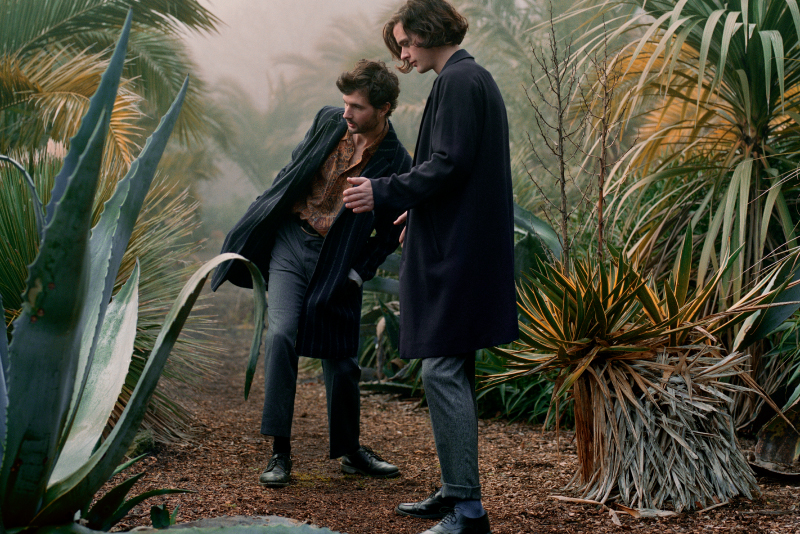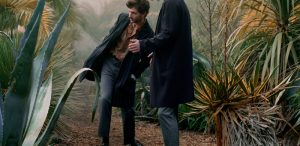Brothers Michael and David Champion exude a sense of cool contentment. Their creative lives poised between the bustle of London and the Isle of Wight, upon which they were born and raised, they seem never to force an issue, glad to set their own pace. While some creatives residing in the City may feel confined and those outside of a City might feel degrees of isolation, they’re able to moderate their experience of both and reap the creative benefits.
Two years on from the release of their plaudit-grabbing sophomore album VAMALA, they’ve freed a sugary anthem called The Garden is Overgrown into the world; a glistening and meticulously crafted indie-pop record that echoes with assurance. We began our discussion with younger brother David on that new record, before touching on video shoots in Berlin, island life and bands of brothers.
Production in the modern age can mean a number of things, but what’s clear from listening to The Garden is Overgrown is that it’s something yourselves and Sean Oakley take seriously. The record is crammed with texture and it’s clear that its arrangement has been carefully considered. Can you talk us through how you came to work with Sean, any preconceived ideas you had going into the recording and how those were realised?
Thank you! It’s really great to hear someone say that. We wanted to make a record which was sonically interesting. We want people to notice something new in the tracks with every listen and so we spent a lot of time experimenting with different sounds and instrumentation. We wanted TGIO to sound as full as possible without sounding too busy or hectic, and the danger with modern studios and equipment is that it’s tempting to just keep piling cool sounds up and up until you’re kind of left with a durge of noise. I like to compare it to a painter with his pallete, in that if he were to mix all of his colours together, he’d be left with brown.
I think what’s really important is the process of choosing what can be removed from a song without detracting from its overall impact. We wanted to make sure that every sound served a purpose and wasn’t just there for the sake of it. It seems kind of paradoxical but sometimes the more you add to a song, the smaller it gets.
We ended up working with Sean because a man called William Moulton Marston decided to write a comic called Wonderwoman in 1942. The only reason Sean found himself in the UK was because his fiancée was working here on the new Wonderwoman film and so he had to temporarily relocate. While he was here he heard some of our tracks and between him and our label, we found ourselves working together. We knew Sean was going to have some serious chops as he’s been working under Rick Rubin for years, but his speed, precision, enthusiasm and energy are really quite amazing. He has great ideas and he brings a real sense of fun and possibility to the process.
How hands on are you in the studio? Are you the type of guys who get to the bare bones of the technology or do you prefer to maintain a sense of wonderment?
I’d say we’re pretty hands on. Mike knows a lot more about the technical side of things than I do and will often come up with some pretty esoteric suggestions as to how a certain sound can best be achieved, but we’re both seriously particular about where a song is going and how we can best realise its potential. We’ve never been ones to go in with a producer and just say “yeah do whatever you think sounds good!”. We’ve always had a clear vision of what we want to achieve sonically.
I think wonderment is very important. It’s pretty crucial to shut your conscious, technical brain off as often as possible in the studio and think “how is this song actually making me feel?” You never really want a song to sound contrived or like it’s been wrestled into submission and you don’t want to get too caught up in technical stuff if possible.
You were in Berlin shooting a music video recently. Does being in front of the camera come naturally for you and what roles do you play in the new piece?
We had a really good time shooting that video. I never feel particularly self conscious when a video is being shot and I always enjoy the process, but it can be pretty weird when you see the finished piece. I think most people are pretty used to seeing photographs of themselves these days, but you suddenly realise that you don’t actually see your own face filmed and moving very often. It’s quite weird, but I think you kind of have to coach yourself through it a bit. We’re both in the video, playing ourselves and we’re definitely having quite a strange time.
Your commitments see you travelling between the Isle of Wight and the mainland. How important is the island to you, both as creatives and as individuals who’ve laid roots there and do you ever see commitments taking you away from island permanently?
The Isle of Wight will always be an important place for us. It’s where we were born and raised and it’s pretty special. The space and solitude really does lend itself to creativity and it’s definitely played a role in our music. It’s also really nice to be able to get away from it quite frequently too though. We both love cities and so the way I see it at the moment is that we kind of get the best of both worlds. We get to see the best parts of various cities in short bursts, then retreat to a place where you can walk for 3 hours and not see another person. Mike lived in London for a couple of years and I’m 50/50 between the isle and London at the moment. I love London and definitely want to live there when I can.
Music history is littered with sibling partnerships; at the moment yourselves and The Lemon Twigs are two exciting names that spring to mind in that respect. Has your journey of music discovery been a joint one and have you therefore always been likely to be part of the same project, or are you in fact more individual, but complementary when you come to work together?
I’d say that siblings in bands tend to work quite well, quite simply because they’ve usually been brought up on exactly the same music. I think if you come from the same musical background you’re more likely than not to be pulling in the same direction creatively. Our tastes are very similar and we always introduce each other to new music. I definitely had a way cooler taste in music than I should have done at 14 though as Mike, the older brother, was always introducing me to new stuff. I can still so clearly remember when he first showed me Smells Like Teen Spirit.
We’re looking forward to having you at Band on the Wall later this month, what can we expect from the show?
We’ve worked on the live show for years and we’ve had several different lineups. I think we’ve got it to a really good point now where we’ve trimmed a lot of the fat off and worked out how best to achieve what we want without too much bombast or clutter. It’s feeling sleek and direct but I also think it’s the biggest sound we’ve ever achieved. We’ve got a guy who’s really into his 80s synths so he’s got a pretty amazing rig. We’ve also managed to make sure that Mike doesn’t have to play guitar anymore so prepare yourselves for some slinky dancing. We can’t wait.



